formerly eScholarship Editions


|
|
|
|
Your search for
'Latin American Studies' in subject
found 86 book(s). | Modify Search | Displaying 21 - 40 of 86 book(s) | |
| 21. | 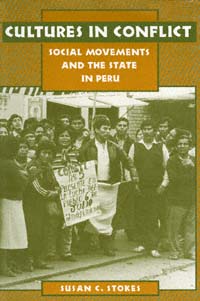 | Title: Cultures in conflict: social movements and the state in Peru Author: Stokes, Susan Carol Published: University of California Press, 1995 Subjects: Latin American Studies | Politics | Sociology | Anthropology | Urban Studies Publisher's Description: In this vivid ethnography set in contemporary Peru, Susan Stokes provides a compelling analysis of the making and unmaking of class consciousness among the urban poor. Her research strategy is multifaceted; through interviews, participant observation, and survey research she digs deeply into the popular culture of the social activists and shantytown residents she studies. The result is a penetrating look at how social movements evolve, how poor people construct independent political cultures, and how the ideological domination of oppressed classes can shatter.This work is a new and vital chapter in the growing literature on the formation of social movements. It chronicles the transformation of Peru's poor from a culture of deference and clientelism in the late 1960s to a population mobilized for radical political action today. [brief] Similar Items |
| 22. | 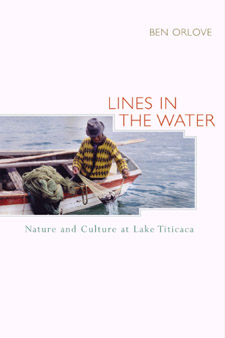 | Title: Lines in the water: nature and culture at Lake Titicaca Author: Orlove, Benjamin S Published: University of California Press, 2002 Subjects: Anthropology | Environmental Studies | Latin American Studies | Conservation Publisher's Description: This beautifully written book weaves reflections on anthropological fieldwork together with evocative meditations on a spectacular landscape as it takes us to the remote indigenous villages on the shore of Lake Titicaca, high in the Peruvian Andes. Ben Orlove brings alive the fishermen, reed cutters, boat builders, and families of this isolated region, and describes the role that Lake Titicaca has played in their culture. He describes the landscapes and rhythms of life in the Andean highlands as he considers the intrusions of modern technology and economic demands in the region. Lines in the Water tells a local version of events that are taking place around the world, but with an unusual outcome: people here have found ways to maintain their cultural autonomy and to protect their fragile mountain environment. The Peruvian highlanders have confronted the pressures of modern culture with remarkable vitality. They use improved boats and gear and sell fish to new markets but have fiercely opposed efforts to strip them of their indigenous traditions. They have retained their customary practice of limiting the amount of fishing and have continued to pass cultural knowledge from one generation to the next--practices that have prevented the ecological crises that have followed commercialization of small-scale fisheries around the world. This book--at once a memoir and an ethnography--is a personal and compelling account of a research experience as well as an elegantly written treatise on themes of global importance. Above all, Orlove reminds us that human relations with the environment, though constantly changing, can be sustainable. [brief] Similar Items |
| 23. | 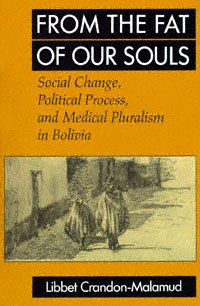 | Title: From the fat of our souls: social change, political process, and medical pluralism in Bolivia Author: Crandon-Malamud, Libbet Published: University of California Press, 1991 Subjects: Anthropology | Latin American Studies | Politics | Medical Anthropology | Medicine Publisher's Description: From the Fat of Our Souls offers a revealing new perspective on medicine, and the reasons for choosing or combining indigenous and cosmopolitan medical systems, in the Andean highlands. Closely observing the dialogue that surrounds medicine and medical care among Indians and Mestizos, Catholics and Protestants, peasants and professionals in the rural town of Kachitu, Libbet Crandon-Malamud finds that medical choice is based not on medical efficacy but on political concerns. Through the primary resource of medicine, people have access to secondary resources, the principal one being social mobility. This investigation of medical pluralism is also a history of class formation and the fluidity of both medical theory and social identity in highland Bolivia, and it is told through the often heartrending, often hilarious stories of the people who live there. [brief] Similar Items |
| 24. | 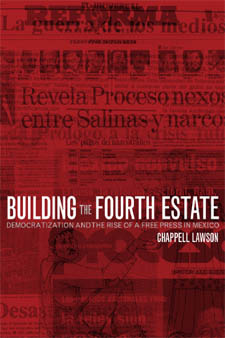 | Title: Building the fourth estate: democratization and the rise of a free press in Mexico Author: Lawson, Chappell H 1967- Published: University of California Press, 2002 Subjects: Politics | Latin American Studies | Media Studies Publisher's Description: Based on an in-depth examination of Mexico's print and broadcast media over the last twenty-five years, this book is the most richly detailed account available of the role of the media in democratization, demonstrating the reciprocal relationship between changes in the press and changes in the political system. In addition to illuminating the nature of political change in Mexico, this accessibly written study also has broad implications for understanding the role of the mass media in democratization around the world. [brief] Similar Items |
| 25. | 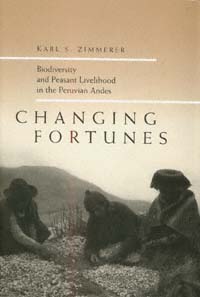 | Title: Changing fortunes: biodiversity and peasant livelihood in the Peruvian Andes Author: Zimmerer, Karl S Published: University of California Press, 1997 Subjects: Anthropology | Geography | Ecology | Latin American Studies Publisher's Description: Two of the world's most pressing needs - biodiversity conservation and agricultural development in the Third World - are addressed in Karl S. Zimmerer's multidisciplinary investigation in geography. Zimmerer challenges current opinion by showing that the world-renowned diversity of crops grown in the Andes may not be as hopelessly endangered as is widely believed. He uses the lengthy history of small-scale farming by Indians in Peru, including contemporary practices and attitudes, to shed light on prospects for the future. During prolonged fieldwork among Peru's Quechua peasants and villagers in the mountains near Cuzco, Zimmerer found convincing evidence that much of the region's biodiversity is being skillfully conserved on a de facto basis, as has been true during centuries of tumultuous agrarian transitions.Diversity occurs unevenly, however, because of the inability of poorer Quechua farmers to plant the same variety as their well-off neighbors and because land use pressures differ in different locations. Social, political, and economic upheavals have accentuated the unevenness, and Zimmerer's geographical findings are all the more important as a result. Diversity is indeed at serious risk, but not necessarily for the same reasons that have been cited by others. The originality of this study is in its correlation of ecological conservation, ethnic expression, and economic development. [brief] Similar Items |
| 26. | 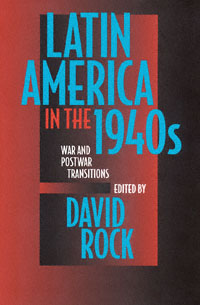 | Title: Latin America in the 1940's: war and postwar transitions Author: Rock, David 1945- Published: University of California Press, 1994 Subjects: History | Politics | Latin American History | Latin American Studies Publisher's Description: Latin America in the 1940s addresses the significant impact that World War II and the onset of the Cold War had on the political development of Latin America. During the middle of this crucial decade many Latin American countries turned from authoritarian regimes toward democracy and the rapid growth of labor unions. By the end of the decade, however, the fledgling democracies had collapsed, the unions were in shambles, and authoritarianism asserted itself once more. This collection of essays by an international group of historians, political scientists, economists, and sociologists confronts a central debate in Latin American studies: Were these events the immediate result of external forces - that is, of the war - or the culmination of internal movements that originated in the 1930s?This book is among the first in its field to evaluate the early Cold War period through the lens of the immediate post-Cold War era. While powerfully reinterpreting the brief resurgence of democracy in Latin America in the 1940s, it offers a comparative foundation from which to judge the renewed trend toward democracy that began in the 1980s and continues during the early 1990s. [brief] Similar Items |
| 27. | 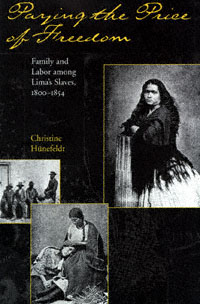 | Title: Paying the price of freedom: family and labor among Lima's slaves, 1800-1854 Author: Hünefeldt, Christine Published: University of California Press, 1995 Subjects: History | Anthropology | Latin American History | Latin American Studies Publisher's Description: Christine Hünefeldt documents in impressive, moving detail the striving and ingenuity, the hard-won triumphs and bitter defeats of slaves who sought liberation in nineteenth-century urban Peru. Drawing on judicial, ecclesiastical, and notarial records - including the testimony of the slaves themselves - she uncovers the various strategies slaves invented to gain their freedom.Hünefeldt pays particular attention to marriage relations and family life. Slaves used their family solidarity as a strategy, while slaveowners used the conflicts within families to prevent manumission. The author's focus on gender relations between slaveowners and slaves, as well as between slaves, is particularly original. Her eye for ethnographic detail and her perceptive reading of the documentary evidence make this book a rich and important contribution to the study of slavery in Latin America. [brief] Similar Items |
| 28. | 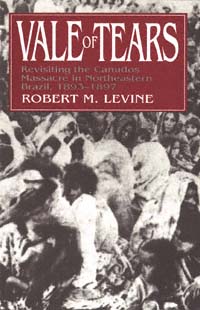 | Title: Vale of tears: revisiting the Canudos massacre in northeastern Brazil, 1893-1897 Author: Levine, Robert M Published: University of California Press, 1992 Subjects: History | Latin American Studies | Latin American History Publisher's Description: The massacre of Canudos In 1897 is a pivotal episode in Brazilian social history. Looking at the event through the eyes of the inhabitants, Levine challenges traditional interpretations and gives weight to the fact that most of the Canudenses were of mixed-raced descent and were thus perceived as opponents to progress and civilization.In 1897 Brazilian military forces destroyed the millenarian settlement of Canudos, murdering as many as 35,000 pious rural folk who had taken refuge in the remote northeast backlands of Brazil. Fictionalized in Mario Vargas Llosa's acclaimed novel, War at the End of the World , Canudos is a pivotal episode in Brazilian social history. When looked at through the eyes of the inhabitants of Canudos, however, this historical incident lends itself to a bold new interpretation which challenges the traditional polemics on the subject. While the Canudos movement has been consistently viewed either as a rebellion of crazed fanatics or as a model of proletarian resistance to oppression, Levine deftly demonstrates that it was, in fact, neither. Vale of Tears probes the reasons for the Brazilian ambivalence toward its social history, giving much weight to the fact that most of the Canudenses were of mixed-race descent. They were perceived as opponents to progress and civilization and, by inference, to Brazil's attempts to "whiten" itself. As a result there are major insights to be found here into Brazilians' self-image over the past century. [brief] Similar Items |
| 29. |  | Title: The New World of the gothic fox: culture and economy in English and Spanish America Author: Véliz, Claudio Published: University of California Press, 1994 Subjects: History | Latin American Studies | Latin American History Publisher's Description: Claudio Véliz adopts the provocative metaphor of foxes and hedgehogs that Isaiah Berlin used to describe opposite types of thinkers. Applying this metaphor to modern culture, economic systems, and the history of the New World, Véliz provides an original and lively approach to understanding the development of English and Spanish America over the past 500 years.According to Véliz, the dominant cultural achievements of Europe's English- and Spanish-speaking peoples have been the Industrial Revolution and the Counter-Reformation, respectively. These overwhelming cultural constructions have strongly influenced the subsequent historical developments of their great cultural outposts in North and South America. The British brought to the New World a stubborn ability to thrive on diversity and change that was entirely consistent with their vernacular Gothic style. The Iberians, by contrast, brought a cultural tradition shaped like a vast baroque dome, a monument to their successful attempt to arrest the changes that threatened their imperial moment.Véliz writes with erudition and wit, using a multitude of sources - historians and classical sociologists, Greek philosophers, today's newspaper sports pages, and modern literature - to support a novel explanation of the prosperity and expanding cultural influence of the gothic fox and the economic and cultural decline endured by the baroque hedgehog. [brief] Similar Items |
| 30. | 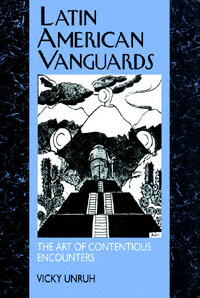 | Title: Latin American vanguards: the art of contentious encounters Author: Unruh, Vicky Published: University of California Press, 1994 Subjects: Literature | Latin American Studies | Literary Theory and Criticism Publisher's Description: In this first comprehensive study of Latin America's literary vanguards of the 1920s and 1930s, Vicky Unruh explores the movement's provocative and polemic nature. Latin American vanguardism - a precursor to the widely acclaimed work of contemporary Latin American writers - was stimulated by the European avant-garde movements of the World War I era. But as Unruh's wide-ranging study attests, the vanguards of Latin America - emerging from the continent's own historical circumstances - developed a very distinct character and voice.Through manifestos, experimental texts, and ribald public performance, the vanguardists' work intertwined art, culture, and the politics of the day to produce a powerful brand of aesthetic activism, one that sparked an entire rethinking of the meaning of art and culture throughout Latin America. [brief] Similar Items |
| 31. |  | Title: Welcoming the undesirables: Brazil and the Jewish question Author: Lesser, Jeff Published: University of California Press, 1995 Subjects: History | Latin American Studies | Jewish Studies | Latin American History Publisher's Description: Jeffrey Lesser's invaluable book tells the poignant and puzzling story of how earlier this century, in spite of the power of anti-Semitic politicians and intellectuals, Jews made their exodus to Brazil, "the land of the future." What motivated the Brazilian government, he asks, to create a secret ban on Jewish entry in 1937 just as Jews desperately sought refuge from Nazism? And why, just one year later, did more Jews enter Brazil legally than ever before? The answers lie in the Brazilian elite's radically contradictory images of Jews and the profound effect of these images on Brazilian national identity and immigration policy.Lesser's work reveals the convoluted workings of Brazil's wartime immigration policy as well as the attempts of desperate refugees to twist the prejudices on which it was based to their advantage. His subtle analysis and telling anecdotes shed light on such pressing issues as race, ethnicity, nativism, and nationalism in postcolonial societies at a time when "ethnic cleansing" in Europe is once again driving increasing numbers of refugees from their homelands. [brief] Similar Items |
| 32. | 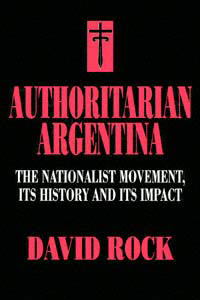 | Title: Authoritarian Argentina: the Nationalist movement, its history, and its impact Author: Rock, David 1945- Published: University of California Press, 1993 Subjects: History | Latin American Studies | Latin American History | Intellectual History Publisher's Description: David Rock has written the first comprehensive study of nationalism in Argentina, a fundamentalist movement pledged to violence and a dictatorship that came to a head with the notorious "disappearances" of the 1970s. This radical, right wing movement has had a profound impact on twentieth-century Ar . . . [more] Similar Items |
| 33. | 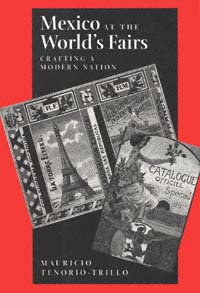 | Title: Mexico at the world's fairs: crafting a modern nation Author: Tenorio-Trillo, Mauricio 1962- Published: University of California Press, 1996 Subjects: History | Latin American History | Latin American Studies | Literature Publisher's Description: This intriguing study of Mexico's participation in world's fairs from 1889 to 1929 explores Mexico's self-presentation at these fairs as a reflection of the country's drive toward nationalization and a modernized image. Mauricio Tenorio-Trillo contrasts Mexico's presence at the 1889 Paris fair - where its display was the largest and most expensive Mexico has ever mounted - with Mexico's presence after the 1910 Mexican Revolution at fairs in Rio de Janeiro in 1922 and Seville in 1929.Rather than seeing the revolution as a sharp break, Tenorio-Trillo points to important continuities between the pre- and post-revolution periods. He also discusses how, internationally, the character of world's fairs was radically transformed during this time, from the Eiffel Tower prototype, encapsulating a wondrous symbolic universe, to the Disneyland model of commodified entertainment.Drawing on cultural, intellectual, urban, literary, social, and art histories, Tenorio-Trillo's thorough and imaginative study presents a broad cultural history of Mexico from 1880 to 1930, set within the context of the origins of Western nationalism, cosmopolitanism, and modernism. [brief] Similar Items |
| 34. | 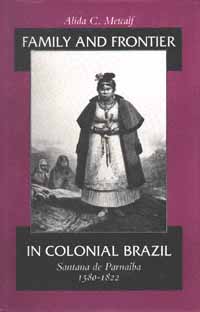 | Title: Family and frontier in colonial Brazil: Santana de Parnaíba, 1580-1822 Author: Metcalf, Alida C 1954- Published: University of California Press, 1992 Subjects: History | Latin American History | Latin American Studies Publisher's Description: Colonial families in the Brazilian town of Santana de Parnaíba lived on the fringe of settlement in a vast and perilous continent. In her revealing community history, Metcalf tells how these settlers pursued family strategies that adapted European custom to the American environment. Turning to recorded events such as marriages, baptisms, and especially inheritances, she discovers that as the newcomers transformed the wilderness into a settled agricultural community, they laid the foundation for a class society of planters, peasants, and slaves. With an engaging description of family life at all three levels of society, the author shows how the families most successful in exploiting and controlling the resources of the wilderness gained wealth, power, and social dominance.Metcalf challenges accepted views by contending that not only external economic forces but also colonial family strategies paved the way for an inegalitarian society in Brazil. Her portrayal of frontier survival and coping, together with the heedless exploitation of wilderness resources, brings a historical perspective to the consideration of Brazil's last frontier, the Amazon. [brief] Similar Items |
| 35. | 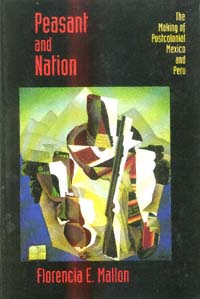 | Title: Peasant and nation: the making of postcolonial Mexico and Peru Author: Mallon, Florencia E 1951- Published: University of California Press, 1995 Subjects: History | Latin American History | Anthropology | Latin American Studies Publisher's Description: Peasant and Nation offers a major new statement on the making of national politics. Comparing the popular political cultures and discourses of postcolonial Mexico and Peru, Florencia Mallon provides a groundbreaking analysis of their effect on the evolution of these nation states. As political history from a variety of subaltern perspectives, the book takes seriously the history of peasant thought and action and the complexity of community politics. It reveals the hierarchy and the heroism, the solidarity and the surveillance, the exploitation and the reciprocity, that coexist in popular political struggle.With this book Mallon not only forges a new path for Latin American history but challenges the very concept of nationalism. Placing it squarely within the struggles for power between colonized and colonizing peoples, she argues that nationalism must be seen not as an integrated ideology that puts the interest of the nation above all other loyalties, but as a project for collective identity over which many political groups and coalitions have struggled. Ambitious and bold, Peasant and Nation both draws on monumental archival research in two countries and enters into spirited dialogue with the literatures of post-colonial studies, gender studies, and peasant studies. [brief] Similar Items |
| 36. | 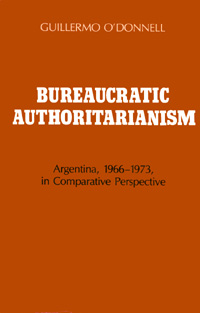 | Title: Bureaucratic authoritarianism: Argentina, 1966-1973, in comparative perspective Author: O'Donnell, Guillermo A Published: University of California Press, 1988 Subjects: Politics | Political Theory | Latin American Studies Similar Items |
| 37. | 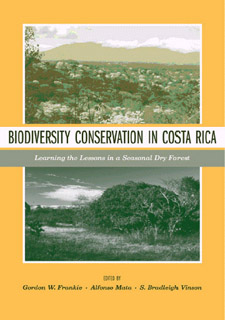 | Title: Biodiversity conservation in Costa Rica: learning the lessons in a seasonal dry forest Author: Frankie, G. W Published: University of California Press, 2004 Subjects: EcologyEvolutionEnvironment | Ecology | Conservation | Latin American Studies Publisher's Description: The beautiful tropical dry forest of northwest Costa Rica, with its highly seasonal rainfall and diversely vegetated landscape, is disappearing even more rapidly than Costa Rica's better-known rain forest, primarily because it has been easier to convert to agriculture. This book, based on more than thirty years of study, offers the first comprehensive look at the ecology, biodiversity, and conservation status of this endangered and fragile region. The contributors, from Costa Rica, Britain, Mexico, and the United States, and representing the fields of ecology, environmental education, policy, and the law, examine the major plant and animal groups living in the dry forest and present the first technical evaluation of Costa Rica's conservation efforts. As they assess the status of their area of specialty in the dry forest, the contributors also look beyond this particular region to show how its plants and animals are ecologically and evolutionarily connected to other geographic areas in Costa Rica and Central America. Their chapters cover topics such as watershed and coastal management, plant phenology, pollination, insects, birds, mammals, amphibians, and reptiles. They also consider the socioeconomic, policy, legal, and political aspects of biodiversity conservation, giving the volume a wide-ranging perspective and making a unique contribution to our knowledge of the tropical dry forest. The book concludes with an important synthesis of the contributors' recommendations on future directions, policies, and actions that will better conserve biodiversity in Costa Rica and other neotropical forests as well. [brief] Similar Items |
| 38. | 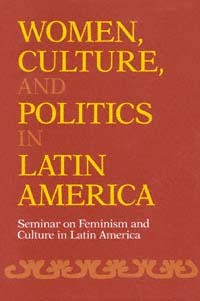 | Title: Women, culture, and politics in Latin America Author: Bergmann, Emilie L 1949- Published: University of California Press, 1992 Subjects: Latin American Studies | Women's Studies | Cultural Anthropology Publisher's Description: The result of a collaboration among eight women scholars, this collection examines the history of women's participation in literary, journalistic, educational, and political activity in Latin American history, with special attention to the first half of this century. Similar Items |
| 39. | 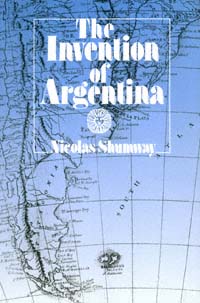 | Title: The invention of Argentina Author: Shumway, Nicolas Published: University of California Press, 1991 Subjects: History | Latin American History | Latin American Studies | Intellectual History Similar Items |
| 40. | 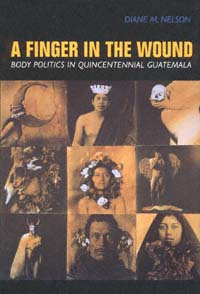 | Title: A finger in the wound: body politics in quincentennial Guatemala Author: Nelson, Diane M 1963- Published: University of California Press, 1999 Subjects: Anthropology | Latin American Studies | Latin American History Publisher's Description: Many Guatemalans speak of Mayan indigenous organizing as "a finger in the wound." Diane Nelson explores the implications of this painfully graphic metaphor in her far-reaching study of the civil war and its aftermath. Why use a body metaphor? What body is wounded, and how does it react to apparent further torture? If this is the condition of the body politic, how do human bodies relate to it - those literally wounded in thirty-five years of war and those locked in the equivocal embrace of sexual conquest, domestic labor, mestizaje , and social change movements?Supported by three and a half years of fieldwork since 1985, Nelson addresses these questions - along with the jokes, ambivalences, and structures of desire that surround them - in both concrete and theoretical terms. She explores the relations among Mayan cultural rights activists, ladino (nonindigenous) Guatemalans, the state as a site of struggle, and transnational forces including Nobel Peace Prizes, UN Conventions, neo-liberal economics, global TV, and gringo anthropologists. Along with indigenous claims and their effect on current attempts at reconstituting civilian authority after decades of military rule, Nelson investigates the notion of Quincentennial Guatemala, which has given focus to the overarching question of Mayan - and Guatemalan - identity. Her work draws from political economy, cultural studies, and psychoanalysis, and has special relevance to ongoing discussions of power, hegemony, and the production of subject positions, as well as gender issues and histories of violence as they relate to postcolonial nation-state formation. [brief] Similar Items |